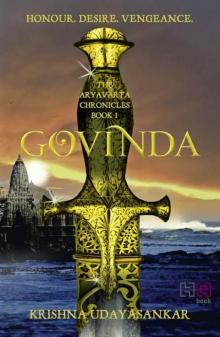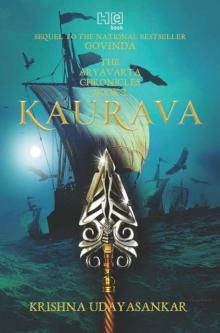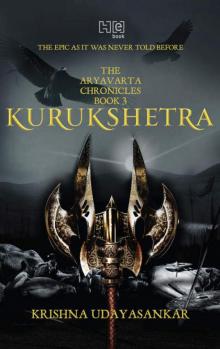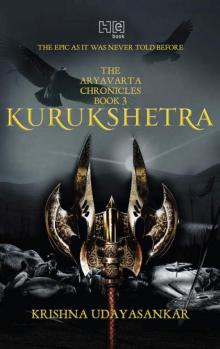- Home
- Krishna Udayasankar
Govinda (The Aryavarta Chronicles) Page 2
Govinda (The Aryavarta Chronicles) Read online
Page 2
It was still light when they reached a tiny stream that flowed out from a small fissure in the ground, but the two decided they had walked enough for the day. They drank of the clear, cool water to their hearts’ content. Parashara quickly doused himself from head to toe and left the princess to bathe in private while he stepped away to pray and meditate, assuring her he would remain within calling distance if she needed him.
By the time he returned, she had picked a few fruits and berries from the surrounding trees to make a sparse meal.
‘We should be there by noon, tomorrow,’ he said as they ate.
She did not reply, lost in thoughts of the future. The rest of their meal was quiet.
Soon after, he settled her into a thick, soft patch of grass that made for a wonderful bed and stretched himself out some distance away. He was lost in pleasant contemplation of the night sky, gazing at the stars as they emerged one by one, when he heard the soft rustle of leaves. He turned to see the young woman walking towards him and greeted her with a confused look. She knelt next to him, her eyes bashful, and placed a gentle hand on his chest to stop him from getting up.
A smile played on the scholar’s lips, but he seemed to reconsider. He shook his head, his eyes shadowed by regret. ‘There’s nothing I can offer you, my dear. Like my father before me, I’m sworn to my order, to the Firstborn, and now, after all that has happened, the rest of my life will be devoted to just one thing – the fall of the Firewrights. There’s no room for a woman – or a family – in my life.’
Her eyes mirrored his sadness. ‘We share a common goal and that has already tied our destinies together. Still …’
She made to stand, but Parashara reached out and grabbed her wrist. Tilting his head back, he looked up at the stars. ‘Destiny is a dangerous master,’ he softly told her, his eyes fixed on the sky. ‘It’ll bind us beyond just this one night, for better or worse …’ He turned to her, meeting her piercing gaze. ‘Bear me a son, conceived in the fire of our common hatred. A son who shall destroy the Firewrights, shatter their sect and uproot it from its foundations. Let that be what we share.’
The princess nodded. Both of them remained still for a while, unsure of themselves. Then, as though they were of one mind, they moved closer.
It was nearly noon, a few days later, when they arrived at Chief Dasha’s village on the River Yamuna. The princess burst into tears at the sight of the wide expanse of flowing water, the mighty currents a memory of all that she had once loved and had now lost, not swept away by the tides of time but slowly dried and shrivelled by human ambition. She cried for what her home had once been and could never be again, for all that was irrevocably gone.
Parashara placed a consoling arm around her. ‘Our son will avenge you, Princess.’
She looked up at him, surprised.
‘I’ve known who you are all along,’ he said. ‘But when I speak of you in future – and believe me I will – I’ll refer only to Chief Dasha’s daughter, the beautiful fisherwoman who moved me to desire … Goodbye, my dear.’
The princess never saw Parashara again. Not when her son was born, not even when he was sent away to his father to study and to learn of the great destiny that awaited him. She held on to no memory, nor to any regret, but an excited, uneasy hope simmered constantly in the depths of her heart.
It would take decades, but she would have her revenge.
Part 1
1
THE TALL MAN SHOOK HIS HEAD. HIS EYES WERE COLD, BRUTALLY calm, as he told his companion, ‘We both know that this is how it must be. The Secret Keeper must die for another to take his place. That is the law.’
The two men considered each other in silence, all emotions suspended in the face of inevitability. A sharp knife flashed in the dark, its metal cutting through skin and flesh in a single, deep thrust. A bloodcurdling scream of pain ripped through the silent night, desecrating the tranquil haze of fragrance from the night-jasmine trees that surrounded the small cluster of huts not too far away and stunning the inhabitants out of their sleep.
The first to tear out of his modest hutment was a young scholar. Almost immediately, he saw the prone figure at the edge of the woods. Calling to others for help, he ran towards the fallen man.
‘Oh Varuna!’ the scholar exclaimed as he took in the scene before him.
The victim was old and shrivelled with age. He wore the ochre robes of an ascetic, but they were worn and tattered. A grizzly white beard covered most of the man’s face; his hair was matted, and messy to match. The shining blade that had pierced right through his feeble, emaciated chest was not a long one, but then the old man was as thin as a parchment. Blood pooled on the ground, dripping off the tip of the blade that emerged from his back.
‘Who did this to you?’ the scholar urged.
‘… doesn’t matter …’ the old man gasped. He closed his eyes and drew a pained breath, willing his body to hold on to mortal existence for just a little longer, till his work here was done. When he opened his eyes again, an irrepressible light shone in them.
A hum of frenzied activity slowly enveloped the two hunched figures as the other residents of the huts milled around, holding torches and braziers. The man looked at the gathered crowd, but gave up as his vision blurred and then darkened altogether.
‘Dwaipayana. Dwaipayana, the Vyasa …’ he wheezed.
‘This is his hermitage. But the Vyasa isn’t here. I … I’m Suka, his son …’
The injured man tried to focus on the speaker, but failed. With great effort, he raised his right hand and placed it on the scholar’s head in a gesture of blessing. ‘Tell your father,’ he said in a trembling voice, ‘for so long we have been sworn enemies, and now there’s no time to set right the past.’
He paused and gestured feebly at the anxious crowd. At a nod from the young scholar the residents of the hermitage moved a respectful distance away. The scholar then raised the old man’s head and placed it in his lap.
The dying man spoke again, but this time his voice was surprisingly strong. ‘We, the line of Agni Angiras, were born of Fire. Firewrights, they call us. Ours was the charge to purify and renew Aryavarta, the land of the noble. But the fire of change has failed and my failure haunts us all. When the Age of Kali dawns, the world as we know it will come to an end. The end is the beginning, and the beginning is hope …’ His strength ebbed, and he descended into a rasping cough.
‘Acharya, please,’ the scholar tried to calm him. But there was more to come.
‘You’re the Vyasa’s son? His heir?’ the old man asked.
The scholar nodded.
‘You’ll be Vyasa after your father?’
Again, he nodded.
The old man laughed softly. ‘Who remains, then, to be Secret Keeper after me? But that is no longer my burden. There are no secrets left in my keeping, not any more. Tell your father that the Firstborn have won … Tell him that I, Ghora Angirasa, died here. Tell him that it’s over.’
The young scholar was frantic. ‘In Varuna’s name, Acharya …’
The Firewright’s tone was suddenly consoling and his eyes held neither confusion nor uncertainty. ‘May the Fire burn bright within you, my son. Be at peace, for I go happy, to the timeless future that awaits me. I leave Aryavarta in good hands.’ No longer was he aware of the man cradling his head, or the crowd standing around them. Instead, he gazed into the distance. His very being glowed with peace. ‘Narayana …’ he called out. Then he closed his eyes and smiled for the last time as a mortal being.
Birds began to twitter softly in the woods surrounding the hermitage. Soon, the sun would rise.
2
‘AND SO, IT BEGINS …’
Govinda Shauri, Commander of Dwaraka, ran his fingers through his wavy, almost curly, hair before throwing both arms up and out in a languorous stretch. He looked with longing at the endless blue sea that extended far beyond the crystalline towers of the island-citadel that was his home.
Dwaraka stood proudly
facing the oceans of the west, the entire length and breadth of Aryavarta behind it. From a distance, it looked like a magnificent mountain of crystal and silver, its tall spires a bridge between the blue of the ocean below and the skies above. A bridge between the heavens and the earth, some called it. Govinda knew better than to spend too much time looking skywards, all the more so from where he stood now, on the tallest tower of the city. His eyes sought the far distance across the never-ending expanse of the dark blue-green waters. The seas were their future, one he longed to throw himself into. The day was clear and inviting and a warm breeze had replaced the monsoon winds that had brought him home over the sea some weeks ago.
Another three weeks, and the winds will be right for us to set out once more.
‘I don’t see you sailing away anytime soon, Brother,’ a tall, fair-skinned man intruded on Govinda’s thoughts.
Balabadra, Govinda’s half-brother, looked every bit the wrestler he was. He drained the goblet of wine in his hand, and twirled it around in his large grip for a while, before finally getting up to refill it. On impulse, he offered the brimming goblet to Govinda and raised his brows in surprise when it was not refused. He poured himself another cup of wine and returned to his seat.
The third man in the room took things in with a slight smile. Ayodha Dhaumya’s long hair was pulled away from his face and held in place by a small scrap of ochre cloth that matched his renunciate’s robes and he wore a string of polished wooden beads around his neck. The short, well-trimmed beard he sported made him look older than he was; nevertheless it added to his charm.
‘In less than a week,’ he ventured, ‘Emperor Jarasandha will have more than ten full divisions of men at Mathura.’
‘Hmm …’ Govinda examined his wine, pensive.
‘It’s all too neatly timed!’ Balabadra glowered. ‘After years and years, Ghora Angirasa finally emerges from hiding, only to die a mysterious death. And just days after that Jarasandha moves his troops to strategic positions throughout the empire. Maraka!’ he swore. ‘A damned plague is upon us!’
‘The Eternal Universe doesn’t work through coincidences,’ Govinda said. ‘It’s simple cause and consequence. The Emperor rose to his current position of power by hunting down and wiping out the Firewrights. But where most were killed, a few, Ghora Angirasa most notable among them, went into hiding, and the possibility of their retribution has held many a monarch, the Emperor included, in check. Ghora’s death means that Jarasandha now has nothing left to fear.’
Balabadra remained sullen. ‘And the mighty Emperor of all Aryavarta – ruler of all that lies south of the Great White Mountains right up to the borders of Dakshinavarta – plans to turn it into a new beginning. One that might spell the end for us too.’
Govinda shrugged lightly and said, ‘Well, not quite Emperor of all Aryavarta. The east is his, no doubt – his own kingdom of Magadha makes an exceptional spot for an imperial capital. Coupled with the garrison he has in the west, at Mathura, his empire is a strong one. However, between the east and the west lie the powerful kingdoms of central Aryavarta.’
‘They’re hardly powerful, trapped between the two garrisons,’ Balabadra pointed out.
‘True, but you must admit they’ve remained fairly independent. They’ve accepted Jarasandha as Emperor in name and they pay their share of taxes and tributes, but their internal affairs remain their own. This is not the great dominion of old that legendary emperors once ruled over. Two things stand undeniably in Jarasandha’s way. First, the terrain – the most direct route to the north-western regions of Old Aryavarta, the land that extends till the natural borders formed by the River Sindhu, is cut off by the desert lands of Matsya. He’d risk losing control over eastern and central Aryavarta if he tried to get his armies through the forests and mountains of the north around Matsya.’
‘And the second?’
‘Us.’
Balabadra roared with laughter at the bold declaration.
Govinda watched him indulgently for a few moments before adding, ‘I mean it. As things stand, the quickest way for Jarasandha to get to, and command, the north-east is by travelling along the coast from Dwaraka to the kingdom of Salwa, and then north towards the frontier. That way, he can avoid Matsya altogether.’
‘Except, of course …’
‘We won’t let him. Not unless he asks nicely,’ Govinda finished with a snide grin.
‘But …’ Dhaumya began, and then paused as his breath caught in a silent gasp as the other man suddenly met his glance.
Govinda’s eyes both begged and defied description. They seemed always to hold many secrets, but they also contained a promise of utter honesty that made the scholar reluctant to pry. Settling at that moment for silence, he studied the young man before him with a thoughtful frown.
Govinda had the strong, chiselled build that even the most sporting noblemen would not manage to acquire, for it took a childhood spent in tough labour and simple, outdoor living. His wavy hair formed a dark halo around his head and was unfashionably short for a nobleman, falling just to his shoulders. He wore a white silk antariya – a length of cloth tied around the waist, passed between the legs, pleated and tucked in at the back – that fell in elegant folds around each leg till the ankles. He had cast aside his scarlet upper robe before stretching out on the couch, but had kept on the sash-like leather belt that held his sword. But for his weapons and his fine clothes, he looked just as he had fifteen years ago. Only, Govinda had then been a simple gwala, a cowherd.
The cowherd who defied a king, Dhaumya mused, his eyes flitting over the mark on Govinda’s chest. Set close to his heart was an artistically traced circle, resembling a stylized lotus. Inside the circle, in proportions so precise and symmetrical as to almost defy human ability, were set nine interlaced triangles in a symbol known as the mark of Sri. It looked like, and was often mistaken for, a birthmark, though undoubtedly it was a tattoo or even the result of a brand. None but the keenest of eyes, or one who knew it was there, could make out the tiny scar left by a sword point on one of the dark triangles – the reminder of a test of Govinda’s true identity.
Govinda’s grandfather had been the king of Surasena till the tyrant Kans, also Govinda’s maternal uncle, had usurped the throne and imprisoned Govinda’s parents, the true heirs of the kingdom, in their own palace prison in Mathura, Surasena’s capital. When Govinda was born, his parents had managed to smuggle their infant son out of prison, an act of desperation and hope for his future and the future of their land. Govinda had been sent to live in hiding where no one would think to look for the Crown Prince of Surasena, among common cowherds and peasants.
Dhaumya, then an acolyte under Surasena’s royal priest Gargya, had been there when the seventeen-year-old Govinda had been discovered and wrested by Kans’s soldiers from his home in a small, quiet village and brought to Mathura to be beheaded in public. He had come to know and love Govinda then, as the young man reclaimed his throne against many odds. But, before long, his rule had been threatened by a new enemy – Jarasandha, Emperor of Aryavarta. After a few short but difficult years in which Govinda and Balabadra had defended their kingdom against Jarasandha’s many onslaughts, they had led their people, the Yadus, to withdraw to their new home on an island off the western coast of Aryavarta. Here, they distanced themselves from the tumultuous affairs of what had then been Jarasandha’s rising empire.
Dwaraka, the new city-state of the Yadus, was an island in more ways than one. Set off from the rest of Aryavarta by the surrounding region Anartta, a daunting mix of mountain and marshland, it had, at first, offered little hope to foster a new nation. The land simply could not support the agricultural and herding activities that were the backbone of all of Aryavarta. But Dwaraka’s founders had remained undaunted. They had eked out what they could from the harsh, barren land to survive. To prosper, they traded. And so began Dwaraka’s slow but inexorable rise as a sea-faring nation with a huge trading port and an impressive navy. Today, it
was one of the commercial gateways to the huge expanse of land that was Aryavarta.
All that had been over fifteen years ago. Still, Dhaumya did not find it difficult to believe that it was the same Govinda who sat before him now, one arm casually outstretched on a bent knee.
‘Don’t you see, Govinda,’ the scholar pleaded, ‘it’s exactly as you two said. The end of the Firewrights means a new beginning for Jarasandha. Unlike the older kingdoms, he has no qualms about whom he rallies to his cause – rogue vassal, remnant Firewright, or some foreign power. His enduring dream of expanding his empire to the old borders of Aryavarta, and perhaps even beyond, is closer to reality than it ever was. More important, he hopes to solidify his control over the domain that’s already his in name. War, alliances, the affairs of the state – all of it have remained at a standstill of sorts for the past some years. But now, with Ghora’s death, the balance is broken and brute strength is all that matters. Jarasandha’s control, nominal as it may seem to you, will soon become absolute. The very same autonomous central kingdoms that have stood directly and indirectly between the Yadus and the Emperor … if they were to join forces against you, or even just get out of the way, it would mean disaster for …’
Balabadra cut in, ‘How much time do you suppose we have before Jarasandha sets out against us?’
‘Not much,’ Govinda replied. ‘He’ll strike hard and fast. This is a matter of power, vengeance and pride. Any one of the three is motivation enough to raze us to the ground.’

 Govinda (The Aryavarta Chronicles)
Govinda (The Aryavarta Chronicles) The Aryavarta Chronicles Kaurava: Book 2
The Aryavarta Chronicles Kaurava: Book 2 The Aryavarta Chronicles Book 03: Kurukshetra
The Aryavarta Chronicles Book 03: Kurukshetra The Aryavarta Chronicles Kurukshetra: Book 3
The Aryavarta Chronicles Kurukshetra: Book 3